Identifying problems and crafting solutions using biomedical data—while never forgetting patients’ needs—is what we’re all about.
The Master of Science in Health Informatics degree integrates health care, health information technology, informatics, and many other fields. Our students learn to analyze and protect patient data, and to improve the quality of medical care and make it more efficient.
Looking at health data from all the angles
At a glance
Format
- On-campus
- Online
Start dates
- Fall
- Spring
Indiana's health care hub
Home to the Schools of Medicine, Nursing, and Dentistry; the Regenstrief Institute; and the VA, the Indianapolis campus has a strong health care focus. IU Indy is a center for technological innovations in health science, where our faculty are engaged in cutting-edge research.
Ready to get started?
Program details

Our Master of Science in Health Informatics is accredited by the Commission on Accreditation for Health Informatics and Information Management Education (CAHIIM) and approved by the American Medical Informatics Association (AMIA)
The Health Informatics accreditor of Indiana University is the Commission on Accreditation for Health Informatics and Information Management Education (CAHIIM). The College’s accreditation for Master’s degree in Health Informatics has been reaffirmed through 2030. All inquiries about the program’s accreditation status should be directed by mail to CAHIIM, 200 East Randolph Street, Suite 5100, Chicago, IL, 60601; by phone at (312) 235-3255; or by email at info@cahiim.org.
Upon completion of the Master of Health Informatics, students attain the following competencies expected of practitioners in the discipline:
Fundamental professional and interdisciplinary skills:
- Analyze problems: Analyze, understand, abstract, and model a specific biomedical problem in terms of their data, information, and knowledge components.
- Produce solutions: Use the analysis to identify and understand the space of possible solutions and generate designs that capture essential aspects of solutions and their components.
- Implement, evaluate, and refine: Carry out the solution (including obtaining necessary resources and managing projects), evaluate it, and iteratively improve it.
- Innovate: Create new theories, typologies, frameworks, representations, methods, and processes to address biomedical informatics problems.
- Work collaboratively: Team effectively with partners within and across disciplines.
Health and health care systems skills:
- Understand the fundamentals of the field in the context of the effective use of biomedical data, information, and knowledge.
- For substantive problems related to scientific inquiry, problem solving, and decision making, apply, analyze, evaluate, and create solutions based on biomedical informatics approaches.
- Apply, analyze, evaluate, and relate biomedical information, concepts, and models spanning molecules to individuals to populations.
- Analyze and evaluate complex biomedical informatics problems in terms of data, information, and knowledge.
Technological skills:
- Apply, analyze, and create data structures, algorithms, programming, mathematics, statistics.
- Apply, analyze, and create technological approaches in the context of biomedical problems.
- Apply and evaluate methods of inquiry and criteria for selecting and using algorithms, techniques, and methods to solve substantive health informatics problems.
Human and social context:
Health Informatics recognizes that people are the end users of biomedical information, draws on the social and behavioral sciences to inform the design, development, and evaluation of technical solutions, policies, and economic, ethical, social, educational, and organizational systems.
The above learning outcomes are guided by this article:
Kulikowski, C. A., Shortliffe, E. H., Currie, L. M., Elkin, P. L., Hunter, L. E., Johnson, T. R., … & Smith, J. W. (2012). AMIA Board white paper: definition of biomedical informatics and specification of core competencies for graduate education in the discipline. Journal of the American Medical Informatics Association, 19(6), 931-938.
- Bachelor's degree and a 3.0 GPA on a 4.0 scale.
- Strong background in one or more of the following:
- Biochemistry
- Biology
- Computer science
- Engineering
- Health information management
- Mathematics
- Nursing
- Physics
- Statistics
- Successful coursework (or equivalent) in:
- Computer programming (e.g., C, C++, Java, Javascript, or Python)
- Databases
- Medical terminology
- Human anatomy and physiology
- The Graduate Record Exam (GRE) is optional for master's applicants.
Curriculum
Our 36-credit-hour program equips students to examine how patients use their health care information, and to the build the tools that make it easier to manage unstructured data and extract useful information. By learning how to appropriately utilize natural language processing and other tools, our graduates can improve clinical decision support, electronic health records management, and patient privacy.
You’ll complete your health informatics master’s degree with either a thesis or a project, which provides a practical solution to a health information problem.
Chat with a student
Career outcomes
$60KMedian starting salary
96%Employed / continuing education
86.8%Retention rate
73.7%Graduation rate
Job titles
- Data analyst
- Data scientist
- Healthcare analyst
- Biostatistician
- IT analyst
Graduates work in
- Hospitals
- Insurance companies
- Government agencies
- Health IT software companies

Luddy students contribute to real-world data projects at The Polis Center
Luddy students work at Polis Center, which gives them the opportunity to use the skills they are learning in a real-world practical application.
Read more on the students work at the Polis Center
Health informatics intern facilitates data-driven policy for the State of Indiana
Palak Rajauria completed an internship as a data analyst with the State of Indiana's Management Performance Hub.
Read more about Palak's internship
